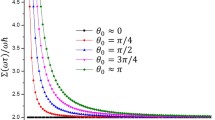Abstract
The quantum adiabatic evolution is very important for quantum mechanics and applied in quantum information processing to solve the difficult problem. The traditional quantum adiabatic algorithms use the linear interpolating to construct quantum evolution paths. We construct special evolution paths to speedup quantum evolutions. By choosing state-dependent correlations some constant time evolution paths may be generated. This result is very useful quantum adiabatic simulations.






Similar content being viewed by others
References
Farhi, E., Goldstone, J., Gutmann, S., et al.: A quantum adiabatic evolution algorithm applied to random instances of an NP-complete problem. Science 292, 472–476 (2001)
Mizel, A., Lidar, D.A., Mitchell, M.: Simple Proof of Equivalence between Adiabatic Quantum Computation and the Circuit Model. Phys. Rev. Lett. 99, 070502 (2007)
Aharonov, D., van Dam, W., Kempe, J., Landau, Z., Lloyd, S., Regev, O.: Adiabatic quantum computation is equivalent to standard quantum computation. SIAM Rev. 50, 755–787 (2008)
Messiah, A.: Quantum Mechanics. Dover Publications, New York (1999)
Hogg, T.: Adiabatic quantum computing for random satisfiability problems. Phys. Rev. A 67(02), 2314 (2003)
Latorre, J.I., Orus, R.: Adiabatic quantum computation and quantum phase transitions. Phys. Rev. A 69(06), 2302 (2004)
Jansen, S., Ruskai, M.B., Seiler, B.: Bounds for the adiabatic approximation with applications to quantum computation. J. Math. Phys. 48(10), 2111 (2007)
Hamma, A., Lidar, D.A.: Adiabatic approximation fr many body systems and quantum computation, arXiv:quant-ph/008040604 (2008)
Choi, V.: Different adiabatic quantum optimization algorithms for the NP-complete exact cover and 3SAT problems. Quantum Infor. Comput. 11, 638–648 (2011)
Zhao, Y.: Reexamination of the quantum adiabatic theorem. Phys. Rev. A 77(03), 2109 (2008)
Comparat, D.: Genaral conditions for a quantum adiabatic evolution. Phys. Rev. A 80(01), 2106 (2009)
Tong, D.M.: Quantitative conditions is necessary in quaranteeing the validity of the adiabatic approximation. Phys. Rev. Lett. 120401, 104 (2010)
Farhi, E, Goldstone, J, Gutmann, S.: Quantum adiabatic evolution algorithms with different paths. arXiv:quant-ph/0208135
Van Dam, W., Mosca, M, Vazirani, U.: How powerful is adiabatic quantum computation?. In: Proceedings of the 42th Ann. Symp. Foundations of Computer Science (FOCS01), pp 279–287. IEEE Computer Society, Las Vegas (2001)
Van Dam, W, Vazirani, U: Limits on quantum adiabatic optimization. 5th Workshop on Quantum Information Processing (QIP 2002) (2001)
Choi, V.: Avoid first order quantum phase transition by changing problem Hamiltonians. arXiv:quant-ph/1010 (1220)
Altshuler, B., Krovi, H., Roland, J.: Anderson localization makes adiabatic quantum optimization fail. Proc. Nat. Acad. Sci. USA 107, 12446–12450 (2010)
Rezakhani, A.T., Kou, W.J., Hamma, A., et al.: Quantum adiabatic brachistochrone. Phys. Rev. Lett. 103, 080502 (2009)
Acknowledgments
This work is supported by the National Natural Science Foundation of China (Nos.61303039, 61272514) and the Fundamental Research Funds for the Central Universities (No.2682014CX095).
Author information
Authors and Affiliations
Corresponding author
Rights and permissions
About this article
Cite this article
He, Y., Deng, Y. & Luo, MX. The Improved Evolution Paths to Speedup Quantum Evolution. Int J Theor Phys 55, 1977–1987 (2016). https://doi.org/10.1007/s10773-015-2838-1
Received:
Accepted:
Published:
Issue Date:
DOI: https://doi.org/10.1007/s10773-015-2838-1




